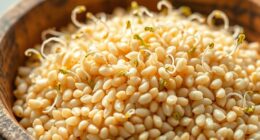Recent 2024 clinical trials show that moderate soy intake generally supports hormone balance in both women and men. You’re unlikely to experience hormonal disruption or feminizing effects if you stick to about one to two servings daily. In fact, soy may even reduce menopausal symptoms and prostate risks. If you want to understand how soy can be part of your healthy diet without upsetting hormones, there’s more to uncover below.
Key Takeaways
- Recent 2024 trials show moderate soy intake does not significantly alter hormone levels in women or men.
- Soy isoflavones may relieve menopausal symptoms without disrupting natural hormone balance.
- Evidence indicates soy does not cause feminizing effects or hormonal imbalances in men.
- Studies emphasize that consistent, moderate soy consumption (1-2 servings daily) is safe and beneficial.
- Individual responses vary, but overall research supports soy’s neutral or positive impact on hormones.

The latest research suggests that moderate soy intake generally doesn’t upset your hormone balance. Instead, it may support it, particularly in women going through menopause. Isoflavones in soy act as phytoestrogens, which means they can weakly bind to estrogen receptors. This interaction might help alleviate menopausal symptoms such as hot flashes and night sweats. Clinical trials in 2024 have shown that women consuming soy regularly report fewer hot flashes and improved mood, without greatly changing hormone levels. This indicates that soy can offer hormonal benefits without disrupting your body’s natural balance. Additionally, the vetted quality of recent studies adds confidence to these findings. For men, concerns about soy’s estrogen-like effects have been largely debunked by recent trials. Studies indicate that soy consumption does not greatly increase estrogen levels or cause feminizing effects. Instead, it might even have protective properties, such as reducing the risk of prostate issues. These findings reassure men that including soy in their diet is unlikely to interfere with testosterone or overall hormone health. It’s also important to recognize that individual responses vary. Factors like genetics, existing health conditions, and the amount of soy consumed influence how your body reacts. The clinical trials of 2024 emphasize that moderate soy intake—roughly one to two servings daily—is generally safe and possibly beneficial for hormone balance. Excessive consumption, however, might have different effects, which are still under investigation.
Frequently Asked Questions
Are There Differences in Soy’s Effects Between Men and Women?
You might wonder if soy affects men and women differently, considering gender differences in hormonal impact. Research shows that soy’s phytoestrogens can influence hormone levels variably, but most studies suggest these effects are mild and not harmful for either gender. While some people worry about hormonal disruptions, current evidence indicates soy is generally safe for both men and women, with no significant adverse effects on hormonal balance when consumed in moderation.
How Much Soy Intake Is Considered Safe Daily?
Did you know that most people can safely consume up to 25 grams of soy daily? For you, this amount helps maintain hormone balance without risking a soy allergy or disrupting your hormones. Experts suggest that moderate intake is generally safe, but if you have sensitivities or concerns, it’s best to consult your healthcare provider. Staying within this limit supports health while minimizing potential hormonal or allergy issues.
Can Soy Consumption Influence Menopause Symptoms?
You might find that soy consumption can influence menopause symptoms positively. Phytoestrogen benefits from soy, acting like plant-based hormones that can help ease hot flashes and night sweats. As you digest soy, your body absorbs these compounds, potentially improving your comfort during menopause. Keep in mind, moderate intake supports soy digestion and maximizes benefits without disrupting your hormones. Always consult your healthcare provider for personalized advice.
Does Soy Affect Hormone-Sensitive Cancer Risks?
You might think soy could be a danger to your health, but current research shows otherwise. Soy phytoestrogens, found in soy foods, don’t considerably increase hormone-sensitive cancer risks when you follow dietary guidelines. In fact, they can be part of a balanced diet without fear. Trust the latest clinical trials—they reveal soy’s safety and potential benefits, so you can enjoy soy without worry about cancer risks.
Are There Specific Populations More Affected by Soy Hormones?
You might find that certain populations are more affected by soy hormones, especially those on plant-based diets or consuming soy protein regularly. For example, individuals with hormone-sensitive conditions should monitor soy intake, as soy contains phytoestrogens that can influence hormone levels. While many can enjoy soy without issues, those with specific health concerns should consult healthcare providers to tailor their soy consumption accordingly.
Conclusion
So, as you consider the latest research, remember that soy’s effects on hormones are nuanced, not black and white. You can trust that moderate soy consumption may support health, not harm it. You can balance your diet wisely, embrace evidence-based choices, and stay informed. You can prioritize your well-being by understanding the science, questioning assumptions, and making mindful decisions—because your health depends on what you know, what you choose, and how you act.










